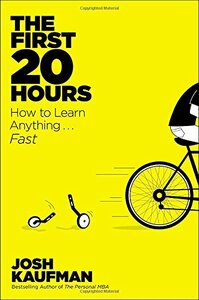Take a photo of a barcode or cover
While my interest in playing the ukulele and going windsurfing is minimal, I was interested in the programming and Colemak sections of this book, with a passing intrigue for yoga. I've actually tried to learn Ruby (on Codecademy) and got so far, and have never seriously contemplated using a keyboard with a different layout. But I am now. I'm seriously thinking of pulling out some of the keys on this Apple 1048 keyboard of mine I bought at an op-shop for $3 and going Colemak.
All up, a slight book that's mostly fun to read - and occasionally educational.
All up, a slight book that's mostly fun to read - and occasionally educational.
Good overview of rapid skill acquisition and learning along with 6 case studies.
All nonfiction March: Book 2
I've always found it easy to acquire new skills; I don't why I'm reading this. I just wanna see what the author has to offer in this book. I have low expectations, though.
..........
I've always found it easy to acquire new skills; I don't why I'm reading this. I just wanna see what the author has to offer in this book. I have low expectations, though.
..........
Josh Kaufman likes to do everything, include read the audio book. (He's not bad at it). The instructions of the book don't take too long to review. They are straightforward and clearly presented. The bulk of the book is Josh relaying his experiences learning some new skills. Interesting, but not altogether great as not enough is drawn to point out the connections between the steps and what he did. In any event there is hope for me to learn something new.
Disappointing. The first 20% of the book present some useful ideas how to aquire a new skill or learn something. The following 80% are stories about various skill, the author has developed. You want to save the money, read some of the other reviews on goodreads and you will know everything of value in this book.
MUST read for all Renaissance Souls who have a healthy addiction to learning!!! ;-)
A good overview of key principles to think through how you learn skills, but nothing too new here. Just a useful framework.
I expected to hate this, but it was surprisingly good. Yes, it's incredibly shallow, and almost entirely about the author's own experiences, and, yes, the examples are painfully detailed at times ... but somehow it works, and gives a plausible outline of how much it's possible to pick up in 20 hours of deliberate learning (Spoiler: much less than enough to consider yourself skilled, but much more than most people expect).
Remember the rule that it takes 10,000 hours to master a skill? In this book, Josh Kaufman is making the case that it only takes 20 to be decent at a skill, a much more manageable number. The first 40 pages are devoted to explaining how to use the first 20 hours to learn something, and then the rest of the book are examples of how he broke down a variety of skills to learn the basics in those 20 hours, including yoga, programming, touch typing, go, ukulele and windsurfing.
It was an interesting read for me, but I realized a few pages in - like all procrastinators - I probably already know how to do this, but actually doing it is a whole other matter. I was hoping learning how to learn something in 20 hours would motivate me to just do it, but it seems it's not to be. Someday, hopefully.
It was an interesting read for me, but I realized a few pages in - like all procrastinators - I probably already know how to do this, but actually doing it is a whole other matter. I was hoping learning how to learn something in 20 hours would motivate me to just do it, but it seems it's not to be. Someday, hopefully.
Many skills can be learned to a sufficient level with 20 hours of focused, strategic effort. In order to do so: deconstruct it into the smallest possible subskills, learn enough about each subskill to be able to practice effectively and self-correct, remove any physical, mental, or emotional barriers, practice the most important subskills for at least 20 hours.




